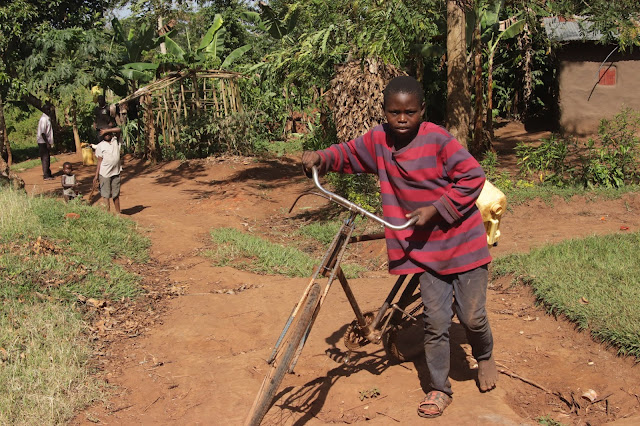Day 1 - Land of a thousand hills and a million smiles
‘Welcome to the land of a thousand hills and a million
smiles’. To my own surprise, I read this statement on my visa approval for
Rwanda. A ‘thousand hills’, that I can understand. The country is indeed very
hilly and probably has even more than a thousand hills. The name 'mille
collines' is an indispensable part of the street scene and the history of
Rwanda. But ‘a million smiles’ makes me
frown, because Rwanda has never really known very happy times. Certainly not
times that put a smile on someone's face. And my country has, I am sorry to
say, a crushing responsibility in that. Our colonization of Congo was not
really an example to the world as far as a colonization can be, nor was our
responsibility in Rwanda and Burundi our best work. At the time, Ruanda-Urundi
was annexed by the Germans and formed thus part of the colony of German East
Africa. After the Germans invaded and occupied Belgium in 1914 at the outbreak
of the First World War, several Belgian brigades out of Congo entered the
German colonies in East Africa in 1916. And with success. The Belgian flag soon
waved in Ruanda-Urundi, among others. After the end of the First World War,
Ruanda-Urundi was assigned to Belgium as a mandate territory by means of the
Treaty of Versailles. It was administered by us out of Belgian Congo, under
authority and as protectorate of the League of Nations and was therefore not
technically a colony. Instead of managing Rwanda-Urundi as a mandate, our
actions were surprisingly like those of a colonizer. Oh yes, we are being
praised for increasing agricultural production, for implementing education
including the construction of schools, for improving health care with the
construction of hospitals and nursing posts and for the expansion of the road
network and infrastructure in general. But like a true colonizer, we also felt
that that should be paid for with profits made on the spot. By mining rich raw
materials and growing crops that were present in large numbers, we were able to
get large profits from the area. The biggest gains came from coffee grown in
areas with rich volcanic soils. The population was also resuired to pay taxes
to Belgium. After all, Rwanda-Urundi had to earn money for the motherland. Quite
a different approach than what you can
expect from a mandate holder and the ultimate proof that we saw Ruanda-Urundi
as a colony. After all, the only mission a mandate holder has, is to prepare a
country for independence by helping prepare its inhabitants to ‘stand on their
own two feet’. But during our ‘mandate’ our tricolore became their flag, the
Brabançonne their national anthem, our languages their official languages (ever
seen a Rwandan passport in Dutch and French?) and our king their head of state.
As a local king summerized it: ‘The UN played no significant role in Ruanda-Urundi.
Belgium was the father’. After the uprising that led to the independence of the
Belgian Congo, we eventually also let go of Ruanda-Urundi. In 1962, our mandate
became independent as two new countries: Rwanda and Burundi. Was our work as a
mandate holder successful? I do not think so. The country was not really
prepared for its independence. Moreover, years later it would appear that the
treatment by our Belgian government of the local population on human level was
not really an example and essentially led to a horrible genocide. And the
latter alone means that there is no reason for ‘a million smiles’, not even a
reason for ‘one smile’.


Comments
Post a Comment